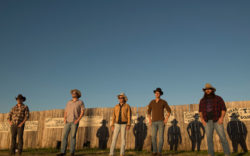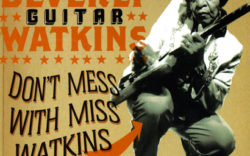A lot gets written about millennials, children born in the 1980s and ’90s whose lives and ambitions are supposedly much different than those of prior generations. These starving artists—overeducated and underachieving twenty- and thirtysomethings—often chase big city and college-town dreams that, barring a lot of breaks and a little luck, might suddenly die on the vine.
For Lilly Hiatt, the daughter of legendary songwriter and musician John Hiatt, the talent is there for her to thrive in Nashville. Still, her latest album, Trinity Lane, out on Athens’ New West Records, is the product of an ambitious 33-year-old maneuvering through a social and creative landscape that hasn’t necessarily dealt young people a fair hand.
Trinity Lane drives listeners through Hiatt’s neighborhood, centered around Nashville’s actual Trinity Lane. The title track’s lyrics figuratively circle through a residential area away from the more mythologized and tourist-friendly side of Music City.
Opening track “All Kinds of People” focuses on the emotional baggage tied to specific places, as Hiatt goes out of her way to avoid passing the house of a former lover. Of course, such alternate routes aren’t generation-specific; the lyrics invite all sorts of listeners to relive their own hometown heartbreak.
Hiatt’s sense of place, paired with a lamenting of losses and struggles, goes multimedia with her video for “The Night David Bowie Died.” The juxtaposition of failed love and the rock legend’s death backs footage of Hiatt coping with inner pain amongst her Nashville neighbors.
The album as a whole, in modern terms, is a first-person think piece. Personal demons beyond just ex-lovers take center stage. Hiatt’s drinking problem and subsequent sobriety, as well as her mother’s suicide when the child was just a year old (“Imposter”) are fearlessly exorcised in song.
<a href=”http://lillyhiatt.bandcamp.com/album/trinity-lane” mce_href=”http://lillyhiatt.bandcamp.com/album/trinity-lane”>Trinity Lane by Lilly Hiatt</a>
Like her father, Hiatt writes songs that are not exclusively country-sounding. What she and fellow Americana upstarts are doing, however, is different than past decades’ roots revivalists.
Millennials were the last generation to grow up with real-life rock stars on television and the radio. They discovered Dad’s Led Zeppelin cassettes and formed friendships with neighborhood kids who discovered punk before the internet, leading to a firm base of rock knowledge. These youngsters, with tastes neither old nor obscure, did not stray too far from their musical raising after changing tastes and a sharpened focus on writing lyrics found them chasing the ghosts of Hank Williams and Townes Van Zandt.
The result of ’90s kids going country is artists like Hiatt. The keyboard part that ties together album closer “See Ya Later,” for instance, will sound comfortably familiar to modern garage rockers, further demonstrating the songwriter’s ear for music beyond county. (Not that those worlds are separate in Hiatt’s neck of the woods; Jack White’s Nashville-based Third Man Records is doing much to give talented young women in country a global platform.)
Maybe Hiatt would be on a big label and live in a swankier part of town if she made her art in a different era, when smart songwriting could net airplay alongside disposable pop. Instead, she lives the so-called millennial life as an independent musician, crafting autobiographical songs with wildly varied influences, all of which are just a click away.
Like what you just read? Support Flagpole by making a donation today. Every dollar you give helps fund our ongoing mission to provide Athens with quality, independent journalism.










